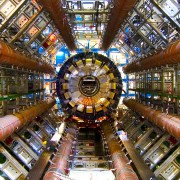What the Higgs boson shows about rationality
A new particle has been discovered, almost certainly the Higgs boson first predicted 48 years ago. If so, then at last the final prediction of the Standard Model has been confirmed. To be sure, there are many questions still to answer, such as how real physics deviates from the Standard Model at very high energies, whether there’s only the one Higgs of the SM or several (e.g. the simplest version of supersymmetry predicts there are 5), and – most important of all – the subject on which I begin my PhD in October, how to quantize gravity. A number of points are worth making:
(1) Scientific theories are trustworthy because they make bold, refutable but in practice accurate predictions. Peter Higgs predicted something no-one could foresee without genuine understanding of nature. What is more, we knew by the end of 2012 the data would suffice to either find a Higgs boson or preclude at least the SM Higgs; the theory took a genuine risk. When has “woo” – religion, astrology, alternative medicine – ever achieved anything like this? By contrast, when has mainstream science ever not done this? In fact, this 48-year gap is far from record-breaking. Charles Darwin predicted some species we took over 100 years to find.
(2) The physicists couch their findings in statistics; they can literally quantify to what extent they know what they’re talking about. We can say with 4.9 sigma we’ve found a new particle at a mass of 125.3 +/- 0.6 GeV/c^2. When do the pedlars of woo ever show this level of epistemic insight? We mostly hear certainty. An interesting exception, which only ever seems to come from theists rather than, say, homeopaths, merit lengthy discussion. Theists occasionally pretend to understand probability when making Bayesian arguments for the existence of God, but they never say the right things to demonstrate their understanding of what they’re talking about.
Quite the reverse, in fact. Let A be the God hypothesis and B be some evidence presented in regard to the question of whether or not A is true. B makes A more likely, i.e. P(A|B) > P(A), iff P(B|A) > P(B), i.e. iff A makes B more likely. Interesting arguments may be presented for B being more likely on the God hypothesis. But what does that tell us? If tells not that God is more likely to exist than not too; the inequality is P(A|B) > P(A), not P(A|B) > P(~A|B). In fact, every honest attempt to calculate a probability for a god’s existence indicates the probability is laughably low whatever evidence is brought to bear.
(3) Every time we don’t know how to explain something, God is said to be the reason for it. Then we find out something else is, so now God is the reason for *that*. W is due to X which is due to Y which is due to … God? Except in claiming W was due to God, it was implied W is due to something not itself due to anything, in which case even acknowledging Y is to show up yourself. The real reason some things are unexplained isn’t because God did them. The real reason is obvious; science is finitely old, so it can only have found finitely many “this is due to that” truths. Therefore, the buck has to currently be stopped somewhere. But “at any time something will be undiscovered” doesn’t even imply “something will at any time be undiscovered” (that conflates for all t there’s an x undiscovered at t with there’s an x such that for all t x is undiscovered at t, which is essentially an error of grammar in predicate logic), let alone that the reason why it’ll be undiscovered is because God is lurking underneath.
(4) The real issue today isn’t how much these reflections embarrass the worst of human thoughts; it’s how they show the triumph of the best ones. Everyone should celebrate what has happened (at least once we know it’s Higgs at 5.0 sigma, which should be soon), even if they’re not a scientist. Because science has not only built our modern world, but is working hard to keep building it further. So even if a Higgs discovery doesn’t currently seem “useful”, judge science broadly – it deserves our respect as not only gratitude, but also identifying with its triumphs.


It shows that no matter what science achieves and proves, there will always be idiots still believing in ancient mythology and killing one another over it; hopefully in time those morons will be eliminated to the equivalent of those believing in Santa.